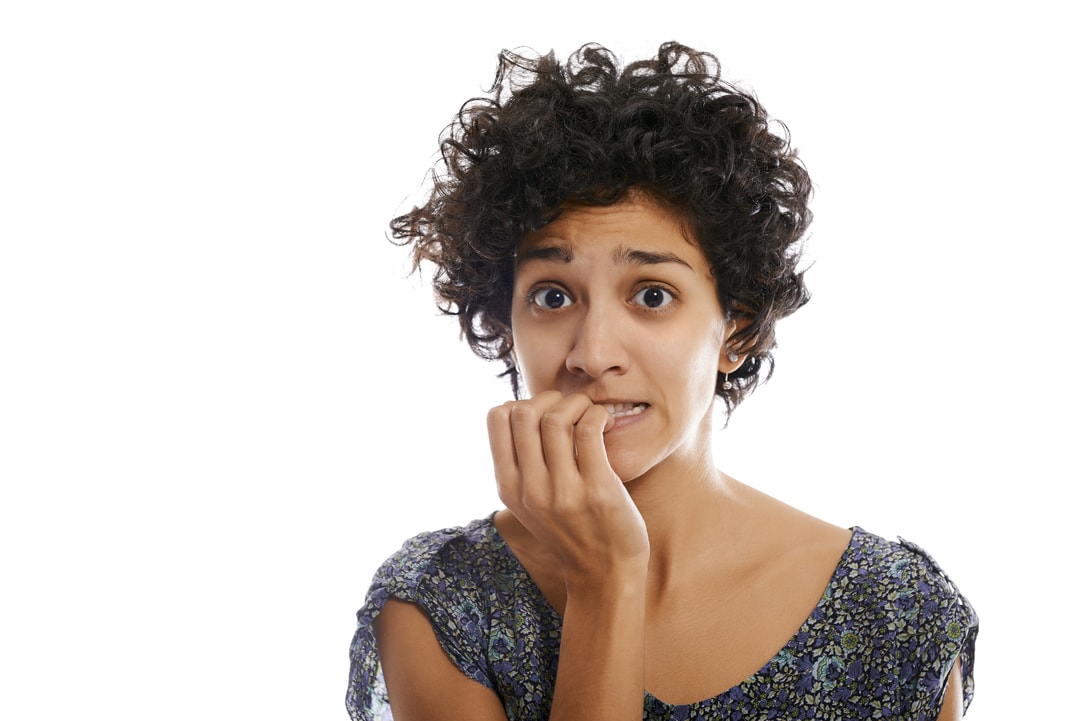Related Posts:
How to calm nerves before starting a new job
6 Steps On How To Overcome Lack Of Confidence
Overwhelmed at your new job? [5 Effective Solutions]
Please
Share!
5 Effective Tips On How To Deal With Anxiety (Life changing)
Anxiety is one of the natural responses everyone faces at some point in their life. Short-lived anxiety is normal and can help you cope with various threats and situations.
However:
Persistent sharp anxiety can have adverse health effects ranging from withdrawal (away from social gatherings) to substance abuse, leaky gut and mental problems, among others. It is vital that you learn how to deal with anxiety and tame it in the early stages.
Anxiety is the charisma killer and can affect your social life in negative ways without you noticing.
Unfortunately, most people assume anxious people are just acting erratic or crazy. Without proper treatment, anxiety can take shape and evolve into chronic cases of depression, sleep disorders, physical problems, hopelessness and suicidal disorders.
Below are five practical tips on how to deal with anxiety and stress:

How anxiety works
A myriad of factors can cause anxiety. However, it is merely a natural adrenal response that is supposed to fuel the body whenever you find yourself in a "fight or flight" situation.
The daily errands and stresses of life can take a toll on the body, causing fatigue, mental and emotional stress.
Experiencing stress and anxiety is normal, especially with so many uncertainties in life. However, it is essential to manage stress levels and there are various natural ways you can achieve that.
Anxiety becomes a concern when the affected is constantly nerve-wracked, especially in social gatherings or when confronted by their worst fears. In these cases, the surplus adrenaline and stress hormone cortisol leak into the blood system, causing mild to chronic anxiety symptoms.
If proper treatment isn't provided, the anxious state becomes the norm and your condition gets worse. You can read about the effects of anxiety on the body here.
Fortunately:
There are several techniques and natural anxiety supplements you can use to reset your adrenal responses and reduce the frequency and severity of your anxiety attacks.
Adrenal response
When your body is under stress, the adrenal cortex produces two primary hormones, adrenaline and cortisol.
These hormones have various uses, but mostly release the glucose stored in the liver to boost energy and control swelling and inflammation. In short, the adrenal response is naturally triggered by fight or flight situations.
The body first judges a situation to determine if it is stressful. This comes from sensory inputs such as sight, hearing and touch.
If the situation is deemed stressful, the hypothalamus part of the brain is activated and a chain reaction of stimulation occurs that end in the release of more cortisol and adrenaline.
These hormones maintain a steady balance of glucose and energy to help the person evade or cope up with the danger.
However:
If you are constantly under stress, this function becomes impaired and blood tests can detect an increase in the stress hormones.
Those suffering from chronic anxiety usually require holistic approaches that combine drugs with physical and mental therapy to repair adrenal responses.

How to calm anxiety
There are various remedies that psychologists, physiotherapists and other experts recommend for those suffering from anxiety.
Learning how to calm anxiety can involve acknowledging the problem, spotting an attack and executing measures that can put an end instantly.
It also includes long-term strategies to eliminate clinical stress from your life.
The two natural ways to calm down anxiety include:
a) Breathing exercise (4 - 7 - 8 technique)
Taking deep breaths is common advice shouted when one is experiencing anger, agitation, increased heart rate, breathing problems and attacks, which are all typical symptoms of anxiety.
Breathing is a natural way to relieve stress and anxiety. The 4-7-8 breathing technique is, notably, effective in calming down anxiety. It involves the following steps:
Empty your lungs by breathing out
Take a slow deep breath through your nose for a count of four seconds
Hold your breath for seven more seconds
Exhale forcefully through your mouth for eight seconds.
While exhaling, purse your lips to make a "whoosh" sound and repeat the cycle four times
In addition to the 4-7-8 technique, it is advisable always to take deep breaths or control your breathing whenever you are confronted with a potential anxiety attack.
Breathing can help control the heart rate and reduce the severity of other symptoms.
b) Change your environment
Anxiety attacks are triggered by situations and the environment you find yourself. If specific situations and places trigger your anxiety, changing the environment is a quick way to calm down the symptoms for the moment.
You can choose to go for a walk and then come back later when you have calmed down or even focus on completing a chore.
Calming down anxiety is all about changing how you think and eliminating the patterns that trigger anxiety.
Nonetheless, it is essential to calm down and reassess the situation, instead of running away to your reclusive hiding space.
The goal is to change and control thinking patterns, allowing you to temporarily let go of the emotions and cycles that cause anxiety.
Changing the physical environment also takes you away from the moment and surrounding that triggered the anxiety attack, so you can focus on calming down.

How to prevent anxiety
Preventing and treating anxiety are inseparable but have a few differences to note.
It is impossible to avoid all forms of anxiety, which is a natural response required for our survival. However, you can prevent an attack or anxiety that is negatively impacting your life.
You can also treat anxiety completely.
Here's how:
1) Natural anxiety supplements
Various natural supplements and herbs have been identified as possible anti-anxiety remedies.
From the infamous Ashwagandha to Maca, Ginseng, Rhodiola and Eleuthero, these naturally occurring herbs are part of a class known as adaptogens or adaptogenic herbs.
They have long been part of ancient Chinese medicinal practices and Indian Ayurveda.
Adaptogens are herbs that help you to adapt to stress and have the following properties:
They increase the body's ability to cope up with stress (internal and external)
Have stimulating effects, both short-term and long-term with continued use
Increase energy and productivity even under stressful conditions
Normalize body functions
Are 100% natural and safe with no side effect
Natural anxiety supplements come as formulas that contain different herbs and compounds that have anti-anxiety properties.
Each formula is different and may include various combinations, so it is vital to review your choices carefully before purchasing any anxiety supplements.
Another great mention is CBD oil, I have personally used and had great relaxing effects with it, ginseng has also been effective in my personal experience. A supplement I like to take whenever I'm feeling tired and unmotivated is this adrenal support supplement made with natural extracts.
Adrenal Supplements
Adrenal supplements are offered to those suffering from adrenal fatigue, chronic stress and hormone imbalances, or declining energy and immune health.
These supplements restore optimal adrenal health and hormone balance in different ways. Some contain vitamins, minerals and nutrients that are the building blocks of adrenal hormones, while others simply support overall adrenal health.
Many adrenal supplements feature a combination of herbs and nutrients that can help calm down your mind, reset normal adrenal function and reduce stress and inflammation.
2) Avoid caffeine
Coffee or caffeine is almost omnipresent, that most people forget its stimulating drug-like potential.
Many people drink more caffeine than they should and rarely recognize the potent medicinal aspect of a refreshing cup of coffee.
However, if you suffer from clinical anxiety, your doctor will advise that you shy away from caffeine or at least avoid it when planning to take on potential anxiety-inducing triggers. Caffeine has its many medicinal and therapeutic benefits.
However, it also carries an extensive profile of adverse side effects ranging from increased irritability to sleep disorders, restlessness, increased heart rate, twitching and nausea.
Taking a lot of caffeine in a day can predispose you to worry and agitation, in this way, resulting in anxiety. It is, therefore, recommendable to avoid caffeine altogether, until you are fully recovered from your previous clinical anxiety.
3) Avoid alcohol
Like caffeine, it is advisable to stay away from alcohol when looking to beat anxiety. However, alcohol is ill-advised for totally different reasons.
It is common to unwind with a glass of beer or your favorite drink after a long stressful day.
Occasional drinking isn't necessarily life-threatening unless your doctor tells you otherwise. Alcohol is a sedative that can help you relax and relieve some of the anxiety symptoms temporarily.
However:
When you depend on alcohol as a way of managing your stress, it will instead leave you much worse, making it very difficult to deal with stress.
You also end up building tolerance to the anti-depressant effects, leaving you wanting more alcohol. The addiction can result in a myriad of negative impacts and chronic cases of anxiety attacks as well as depression.
4) Exercise
Exercising is another great way to manage anxiety, if you start feeling anxious and need to get out of your head, try going for a walk or swim.
Your brain will spend energy focusing on the exercise, and adrenal response will fade away.
Conclusion
Anxiety is a natural response necessary for fight or flight scenarios and can be helpful in different situations.
However, chronic persistent anxiety is a serious medical condition that requires medical treatment.
Stress and anxiety affect people from all walks of life and there is no reason to be ashamed.
Left untreated, the state only gets worse. It can result in severe pain, distress, mental health disorders, drug abuse, digestive and appetite issues, sleep disorders, heart disease, physical problems and many more.
It is crucial to address the issue in the early stages and find ways to prevent anxiety and relieve reoccurring symptoms.
Long-term strategies for managing and the condition are also vital. As a global problem, there are several remedies available for treating anxiety, including pharmaceutical drugs that aid relaxation and relieve specific symptoms.
Make sure you review and compare all offers carefully before making a choice. More importantly, consult your doctor to determine the best solution for your needs, especially if you are under medication or have an underlying medical condition.
Become Suave!
Read another post: